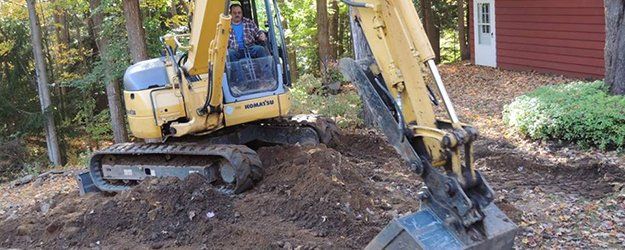Excavating Ohio - Leading Excavation Specialists for Ohio Projects
Excavating Ohio - Leading Excavation Specialists for Ohio Projects
Blog Article
Comprehensive Excavation Techniques: Grasping the Principles for Success
In the realm of building and construction and civil design, the relevance of effective excavation strategies can not be overstated. The cautious planning, accurate implementation, and precise interest to detail needed in excavation jobs require a thorough approach that encompasses various basic facets. From initial soil evaluation to the application of safety and security steps and normal progress monitoring, grasping these core elements is important for accomplishing success in any type of excavation venture. The real proficiency lies not just in understanding these basics but in flawlessly integrating them to navigate the complexities of excavation tasks with finesse.
Understanding Excavation Job Planning

The initial phase of any type of excavation task is the planning stage, where critical choices are made that can substantially impact the end result of the project. Comprehending the task scope, timeline, and spending plan constraints is important for developing a detailed excavation strategy that guarantees the task's success.
One secret element of excavation task preparation is the development of an in-depth timeline that details the series of deadlines, landmarks, and activities. This timeline works as a roadmap for the project group, permitting them to track development and make needed adjustments to ensure the job remains on timetable. In addition, a well-defined budget plan that makes up all expenses, consisting of tools leasing, labor costs, and products, is crucial for avoiding price overruns and delays. By very carefully taking into consideration all these elements throughout the drawing board, excavation jobs can be executed efficiently and properly, bring about effective outcomes.
Soil Evaluation and Site Assessment
Carrying out complete dirt evaluation and site analysis is an important action in the preparation phase of any type of excavation project. Soil evaluation entails identifying the composition, framework, and properties of the soil at the excavation website. This info is important for comprehending the dirt's bearing capacity, dampness content, and potential for erosion, which are essential aspects in figuring out the excavation methods and equipment required for the project.
Site analysis surpasses soil evaluation and encompasses a broader analysis of the total website problems. This examination consists of recognizing any potential dangers, such as below ground utilities, environmental problems, or unpredictable surface, that might influence the excavation procedure. By completely evaluating the site, project supervisors can develop efficient excavation methods that focus on safety, efficiency, and environmental management.
Utilizing advanced technologies like ground-penetrating radar, dirt tasting, and drone surveys can enhance the precision and efficiency of dirt evaluation and site evaluation. Spending time and sources in these preliminary actions can eventually conserve time and protect against expensive delays or complications during the excavation process.
Devices Choice and Use
Efficient excavation tasks depend greatly on tactical tools choice and application to make certain optimal efficiency and performance. Selecting the ideal devices for the job is critical in maximizing efficiency and reducing downtime. Elements such as the type of dirt, depth of excavation, and task range play a substantial role in figuring out one of the most appropriate devices for the job at hand.

In addition to picking the appropriate tools, correct usage is key to project success. Operators needs to be trained to handle the equipment securely and efficiently - excavating ohio. Normal maintenance checks and prompt repair services aid stop breakdowns and make certain regular efficiency throughout the project
Safety And Security Actions and Laws Compliance
In the realm of excavation projects, prioritizing safety and security actions and compliance with guidelines is critical to making certain a safe and secure and lawfully sound functional setting. Safety actions incorporate an array of methods, including performing detailed website analyses, executing visit the website appropriate signage and obstacles, and giving ample safety and security training for all workers involved in the excavation procedure. Adherence to laws, such as OSHA demands in the USA, makes certain that the excavation job satisfies the essential criteria to protect employees, onlookers, and the surrounding setting.

Tracking Progression and Adjusting Techniques
How can project supervisors properly track the advancement of excavation tasks and adapt their approaches as necessary to maximize outcomes? Monitoring progress is necessary for guaranteeing that excavation jobs remain on track and fulfill target dates. Task managers can utilize various tools and techniques to track development, such as daily progress records, regular site evaluations, and progressed monitoring modern technologies like drones and general practitioners tracking systems. By continually keeping track of the job's advancement, supervisors can recognize any type of potential hold-ups or problems at an early stage and take proactive measures to address them.

Final Thought
In final thought, mastering the principles of thorough excavation approaches is crucial for the success of any type of project. By understanding task planning, evaluating soil and site problems, picking ideal devices, conforming with safety and security regulations, and monitoring development, task supervisors view publisher site can guarantee a smooth and effective excavation procedure. Applying these techniques will cause successful results and minimize potential threats or problems during the excavation job.
The initial phase of any kind of excavation job is the preparation stage, where vital decisions are made that can significantly affect the result of the project. Recognizing the job timeline, extent, and budget plan restrictions is critical for producing an extensive excavation plan that makes sure the project's success.
Just how can predict managers properly track the innovation of excavation tasks and adapt their techniques as necessary to optimize results? By closely monitoring progression and being ready to adjust strategies, task supervisors can improve the overall success of excavation jobs.
By understanding project preparation, examining soil and website problems, picking ideal devices, conforming with safety guidelines, and keeping an eye on progress, task supervisors can ensure a efficient and smooth excavation procedure.
Report this page